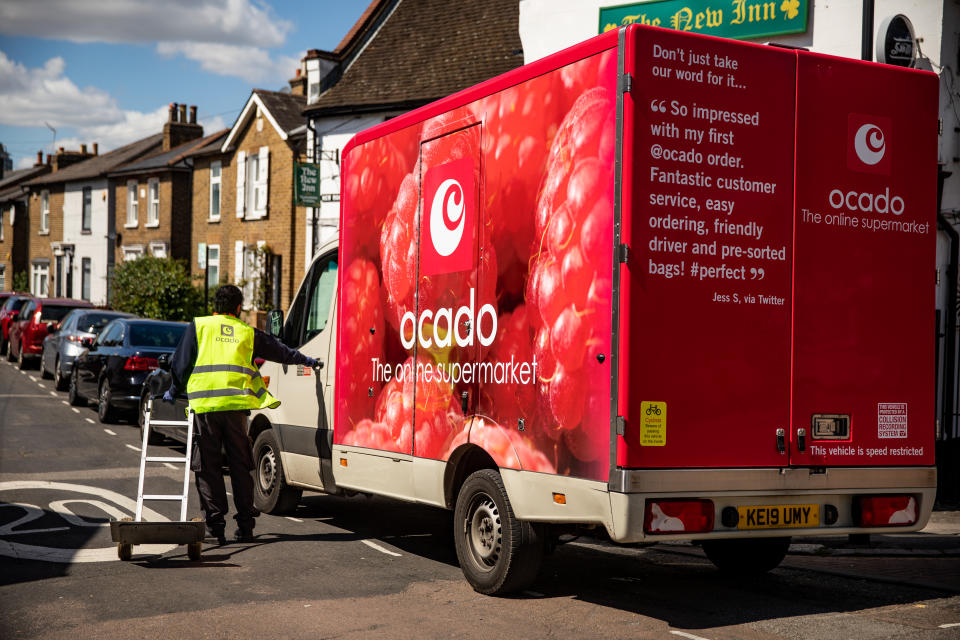What to Watch: Ocado boost, PMI data, ITV and Virgin Money take COVID-19 hit

Here are the top business, market, and economic stories you should be watching today in the UK, Europe, and abroad:
Ocado shares surge on soaring sales
Ocado shares surged (OCDO.L) 3.9% on Wednesday, after it reported a 40.4% rise in retail sales over the past two months year-on-year.
Demand for online supermarket deliveries has soared in Britain during the lockdown.
Ocado’s update ahead of an annual general meeting (AGM) this week said it had significantly boosted capacity to meet demand, though said shopping patterns were increasingly “more normal” after a wave of stockpiling.
It faces a row over its CEO’s £58.7m ($72.6m) pay packet at the AGM, with investor Royal London Asset Management calling it “excessive,” according to Reuters.
ITV furloughs staff as ad sales sink
ITV (ITV.L) has furloughed 15% of its UK workforce as advertising sales dry up and production grinds to a halt amid the coronavirus crisis.
The broadcaster said on Wednesday it has placed 800 staff on furlough under the government’s job retention scheme. Most were staff in the ITV Studios business, which produces programmes such as Love Island, Coronation Street, and Benidorm.
Production on most shows has had to be paused due to the pandemic and earlier this week ITV cancelled this year’s series of Love Island.
Revenue at ITV studios fell 11% in the first three months of the year to £342m ($423m). ITV has already announced it is cutting its programming budget by £100m this year.
Virgin Money sets aside £232m over pandemic
Challenger bank Virgin Money (VMUK.L) has taken a £232m ($289m) charge to cover the potential impact of the COVID-19 pandemic.
Virgin Money said on Wednesday it had set aside £232m over the last 6 months to cover an expected increase in losses, with £146m of the provisions directly linked to COVID-19.
The group, which also runs the Clydesdale Bank and Yorkshire Bank, set aside just £77m to cover losses in the same period a year earlier.
UK construction industry suffers collapse of ‘historic proportions’
The UK construction sector experienced its fastest decline in output ever in April, as the coronavirus pandemic prompted widespread site closures and shutdowns across the entire supply chain.
The purchasing managers’ index reading from IHS Markit’s closely watched survey of the sector came in at 8.2 in April, far worse than analyst forecasts of 22.0.
The figure, the worst since the survey began in 1997, is down from 39.3 in March. The previous survey record low was 27.8 in February 2009.
PMIs are an indicator of private sector activity and are given on a scale of 1 to 100. Anything above 50 signals growth, while anything below means contraction.
European stocks slide on bleak PMI data
European stock markets opened lower on Wednesday, as investors digested bleak European business data and warnings from Federal Reserve policymakers over a “slow” economic recovery from the coronavirus crisis.
The pan-European Stoxx 50 index (^STOXX50E) and Germany’s DAX (^GDAXI) were both trading 0.2% lower, while France’s CAC 40 (^FCHI) was down 0.3% in early trading in London. Britain’s FTSE 100 (^FTSE) was trading flat.
Purchasing managers’ index (PMI) data showed activity in services hit a record low in the eurozone in April. The headline figure plummeted to 13.6 from an already grim 29.7, its lowest reading since the survey began 22 years ago.
“With a large part of the region's economy shut down while COVID-19 infections spiked higher, the economic data for April were inevitably going to be bad, but the scale of the decline is still shocking,” said Chris Williamson, chief business economist at IHS Markit, which produces the survey.
He said it pointed to a 7.5% contraction in GDP in the second quarter in the eurozone.
Markets rose overnight in Asia however. Investors saw China’s central bank’s latest fixing of the yuan as a ‘neutral’ move vis-a-vis the US after the currency sank to a one-month low against the dollar on Wednesday.
China’s Shanghai Composite index (000001.SS) was up 0.6%, and the Hong Kong Hang Seng (^HSI) was up 1.2%. Markets were closed in Japan for a national holiday.
What to expect in the US
S&P 500 futures (ES=F), Dow Jones Industrial Average futures (YM=F) and Nasdaq futures (NQ=F) were all trading around 0.7% higher at around 10.30am in London.

 Yahoo Finance
Yahoo Finance 